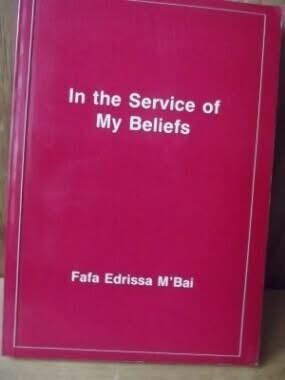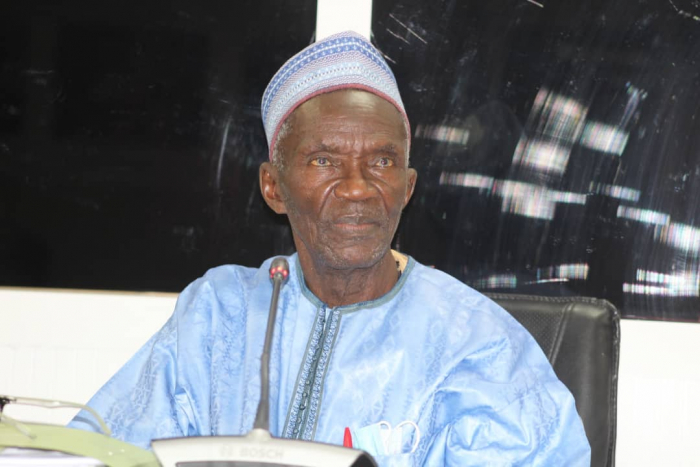
In the realm of knowledge and intellectual pursuits, few works resonate across professions and generations like Fafa Edrissa M’Bai’s In the Service of My Beliefs.
This remarkable book stands as a valuable resource for journalists, lawyers, government officials, and public policy influencers alike. Its compelling insights, drawn from decades of legal, political, and intellectual experiences, offer guidance and inspiration to those shaping the world around them. For anyone seeking wisdom on governance, law, and societal transformation, this book is nothing short of essential reading.
As I grow older, the search for knowledge continues to gnaw at me. I seek, I learn, I read, I think. Reading is liberating—it transports us into the minds of great individuals who have shared their thoughts with past, present, and future generations.
It is through reading that we gain access to the vast reservoirs of human knowledge, and Fafa Edrissa M’Bai’s In the Service of My Beliefs is a testament to this truth.
Published in 1992 during the First Republic, In the Service of My Beliefs is a 200-page collection of 43 articles and speeches written or delivered by Fafa Edrissa M’Bai between 1974 and 1992.
This book is not an autobiography but a curated anthology that offers a window into the mind of one of The Gambia’s most influential legal and intellectual figures.
While writings and speeches alone cannot fully encapsulate the essence of a public figure, they provide invaluable insights into their opinions, motivations, and art of persuasion.
Fafa’s work is no exception, as it sheds light on the intentions and convictions of a man who played a pivotal role in shaping the political and legal landscape of The Gambia.

The documents in the book are arranged chronologically, reflecting the evolution of Fafa’s thoughts and experiences. Five pieces date from 1974 to 1980, ten from 1982, seventeen from 1983, six from 1984, and the final five from 1985 to 1992.
Notably, 36 of the 43 texts correspond to his period of ministerial activity, highlighting his deep engagement with governance and public service.
While most of the texts were produced in The Gambia for Gambian audiences, a few were crafted for international platforms, showcasing Fafa’s global perspective. These include speeches delivered in Windsor (Great Britain), Montego Bay (Jamaica), Colombo (Sri Lanka), Addis Ababa (Ethiopia), Dakar (Senegal), Budapest (Hungary), and Wellington (New Zealand).
Domestically, his speeches were presented in diverse settings, from the National Assembly during legislative debates to schools such as Gambia High School, Armitage, Gambia College, and GTTI. This breadth of engagement underscores Fafa’s commitment to addressing a wide array of audiences, from policymakers to students.
The book also includes three newspaper articles, two of which were published in 1976 in The Gambia News Bulletin. These articles delve into legal issues, exploring the operation of African legal systems and the relationship between British law and Islamic practices on inheritance and wills.
The third article, published in 1984 in The Gambia Times, examines the dynamic relationship between the press and politicians. These writings reflect Fafa’s intellectual rigour and his ability to navigate complex legal and societal issues with clarity and insight.
Fafa’s love for knowledge and literature was a defining aspect of his character. On one particularly memorable occasion, he autographed my copy of In the Service of My Beliefs, a gesture that remains close to my heart.
Whenever Fafa visited the United States, his first stop was always Barnes & Noble, where he spent hours immersed in books, exploring worlds of ideas and knowledge. It was not unusual for him to return home with a suitcase brimming with books—a testament to his insatiable curiosity and lifelong pursuit of learning. This image of Fafa—a man of boundless intellect with a suitcase of books in hand—is one that captures the essence of his being.

In the Service of My Beliefs is among Fafa Edrissa M’Bai’s impactful literary contributions, alongside his thought-provoking work Senegambian Insight, which further reflects his deep engagement with the history and identity of the Senegambia region. While not the focus of this review, it serves as a reminder of his versatility and enduring legacy as both a legal and literary figure.
Judging the actions and legacy of public figures like Fafa Edrissa M’Bai requires both time and perspective. While history may still be too recent to fully evaluate his impact, the compilation of his writings and speeches in In the Service of My Beliefs is an indispensable resource. Such collections preserve the thoughts and ideas of influential individuals, ensuring that future generations can learn from their experiences and draw inspiration from their words.
Fafa’s contribution through this book is instrumental, not only as a record of his intellectual journey but also as a guide for those who seek to understand the interplay between law, governance, and society. His work reminds us of the enduring power of ideas and the importance of documenting them for posterity.
By Alagi Yorro Jallow.










Recent Comments